Artists' Writing
Artists' Writing

Frozen Tears II
Texts By: Kathy Acker, Mireille Andrès, Antonin Artaud, Dominique Auch, Ned Baldwin, Stephen Barber, Georges Bataille, Baudelaire, John Beagles, Mark Beasley, Dodie Bellamy, Alissa Bennett, Simon Bill, Jesse Bransford, R.A.Bransford Jr Esq, Paul Buck, Bonnie Camplin, Aline Bouvy/John Gillis, Dennis Cooper, John Cussans, Trinie Dalton, Sue De Beer, Brock Enright, Felix Ensslin, Dan Fox, Robert Garnett, Paul Green, Matthew Greene, Fernando Guerreiro, Pierre Guyotat, Ilana Halperin, Glen Helfand, Jacques Henric, Rachel Howe, Ben Kaleb Brantley, Seth Kelly, Kevin Killian, Christopher Knowles, Jennifer Krasinski, Cedar Lewisohn, Lorenzo De Los Angeles Iii, Rachel Lowther, Dave Martin, Karl Marx, Casey Mckinney, Gean Moreno, J.P. Munro, Paulina Olowska, Simon O¹Sullivan, Arthur Ou, Damon Packard, Mike Paré, Graham Parker, Wotjek Puslowski, Adam Putnam, Ian Rafael Titus, Eugène Savitzkaya, Eric Schnell, Amy Sillman, Allison Smith, Joanne Tatham/ Tom O'sullivan, Daniel Torop, Genya Turovsky, Banks Violette, Benjamin Weissman, Ivan Witenstein, Thom Wolf

Frozen Tears I
Texts By: Art & Language, Fabienne Audéoud, Dave Beech, David Burrows, Ccru, Jake Chapman, John Cussans, Johnny Golding, Inventory, Martin Mcgeown, Lucy Mckenzie, Esther Planas, Graham Ramsay, John Russell, Clara Ursitti, Andrew Williamson.
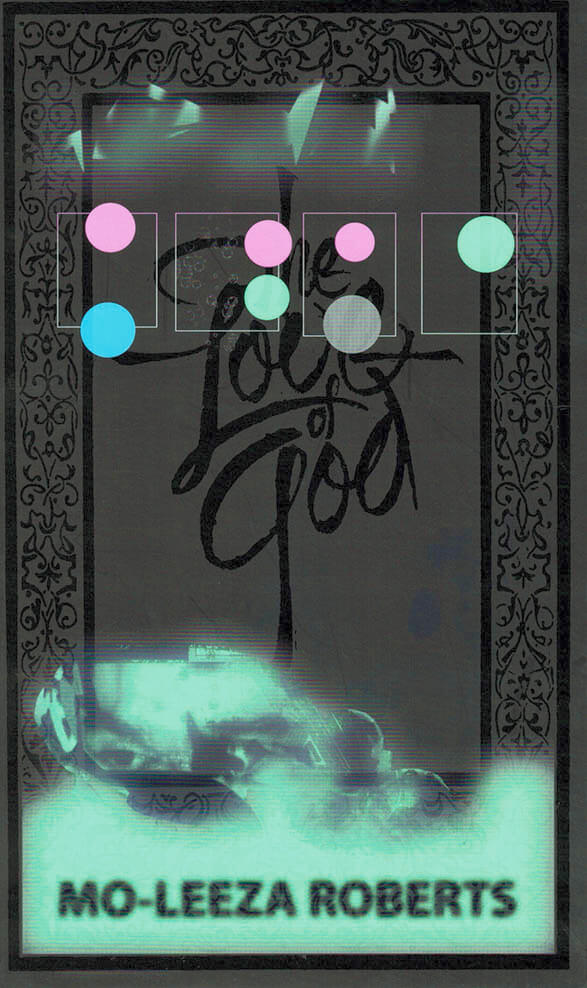
Head
Mo-Leeza Robert's novel Head describes the desperate future that clusters around Head Gallery like cockroaches swarming over a pig's head. It is at once critical and complicit, deluded and envious. Jerry-rigging saccharine sci-fi, with a leavened mush of curatorial artspeak, artists, collectors, hanger-ons and other art world actors explode in ecstasy, pain, or self-induced eradication – all, according to the whims of the Head Gallery, which remains an anonymous and inviolate force, the overseer of events and a selfless accumulator of prestige and wealth. Familiar contemporary artists are reanimated for the future, giving the events described an unsettling familiarity. Any reader familiar with the art world should feel both seduced, and infected. It is like Dickens but with laughs induced by our approaching extinction, and like Salò, written, directed and starred in by Barbara Gladstone.

Doggo
“After all we all want to be fucked by Bruce Willis. Baby-penis, Man-Father, penis-stool, envelope-sheath. The Fantasy is available to us all in a spectacle of scale. There is no false consciousness.”
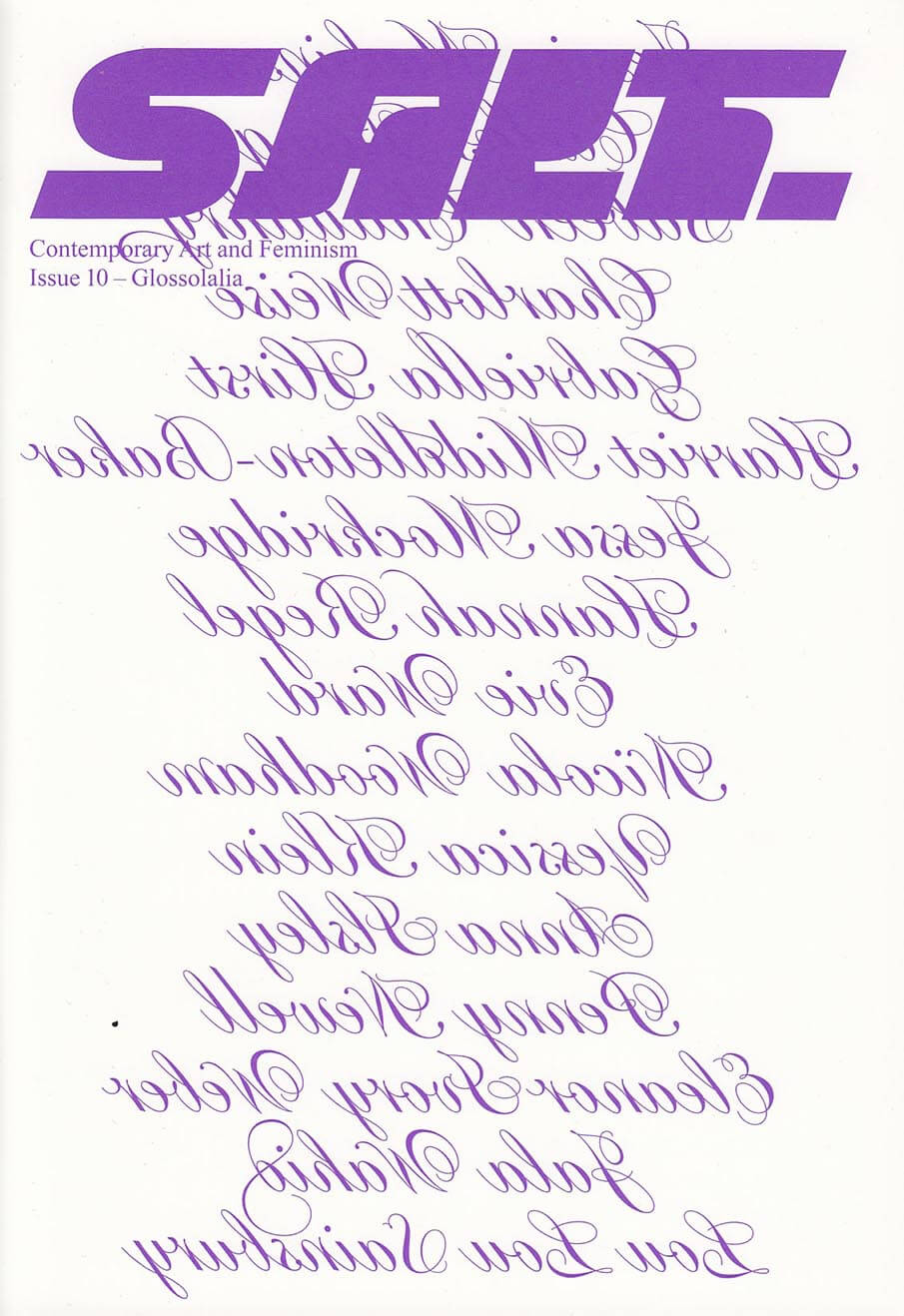
Salt Magazine #10
Jala Wahid, Thea Smith and 1 more
SALT.’s tenth issue is themed ‘Glossolalia’. Glossolalia means to speak in tongues, to speak in a language misunderstood, perhaps dead, perhaps not yet existent: a latent language waiting to be translated. It is in this almost-silence that we have found our submissions to reside, often emerging from a feeling of isolation or alienation where a will to speak reverberates but has not yet come to the fore.
Contributors: Sabeen Chaudhry, Gabriella Hirst, Anna Ilsley, Yessica Klein, Carlos Kong, Jessie Makinson, Harriet Middleton Baker, Jessa Mockridge, Penny Newell, Hannah Regel, Lou Lou Sainsbury, Thea Smith, Jala Wahid, Evie Ward, Eleanor Ivory Weber, Charlott Weise, Nicola Woodham.
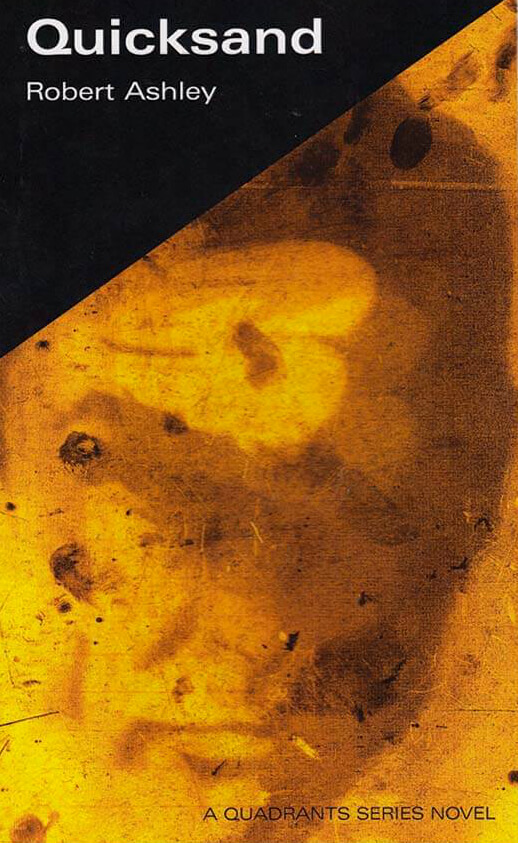
Quicksand
QUICKSAND was written to be an opera libretto. But it was written in the form of a novel....I am devoted to "mystery" stories. I read them one after another, mostly two or three times. Some of the best writers today are writing in this form. So, I thought that I would try to make an opera libretto from a mystery story, told verbatim. That is, the libretto and the novel would be the same: no scenes moved around or actions adapted to the proportions of a libretto, just tell the story the way it's told in the novel. But first I needed a novel....So that meant I had to write a mystery novel. Where do you start? The answer is: I always need a 'location' to be inspired to tell a story. Everything in the novel is true, except for a lot of the facts.
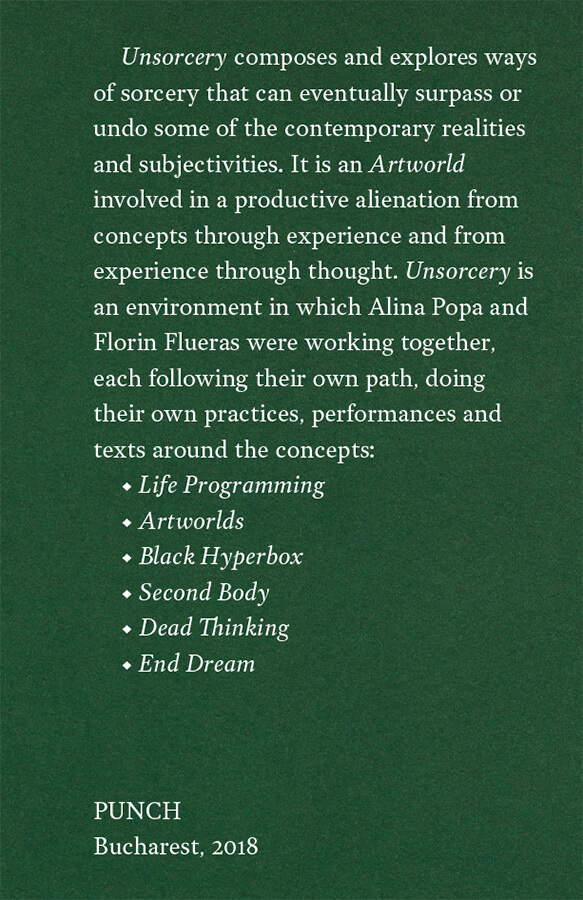
Unsorcery
Unsorcery composes and explores ways of sorcery that can eventually surpass or undo some of the contemporary realities and subjectivities. It is an Artworld involved in a productive alienation from concepts through experience and from experience through thought. Unsorcery is an environment in which Alina Popa and Florin Flueras were working together, each following their own path, doing their own practices, texts and performances around the concepts: Life Programing, Artworlds, Black Hyperbox, Second Body, Dead Thinking, End Dream.
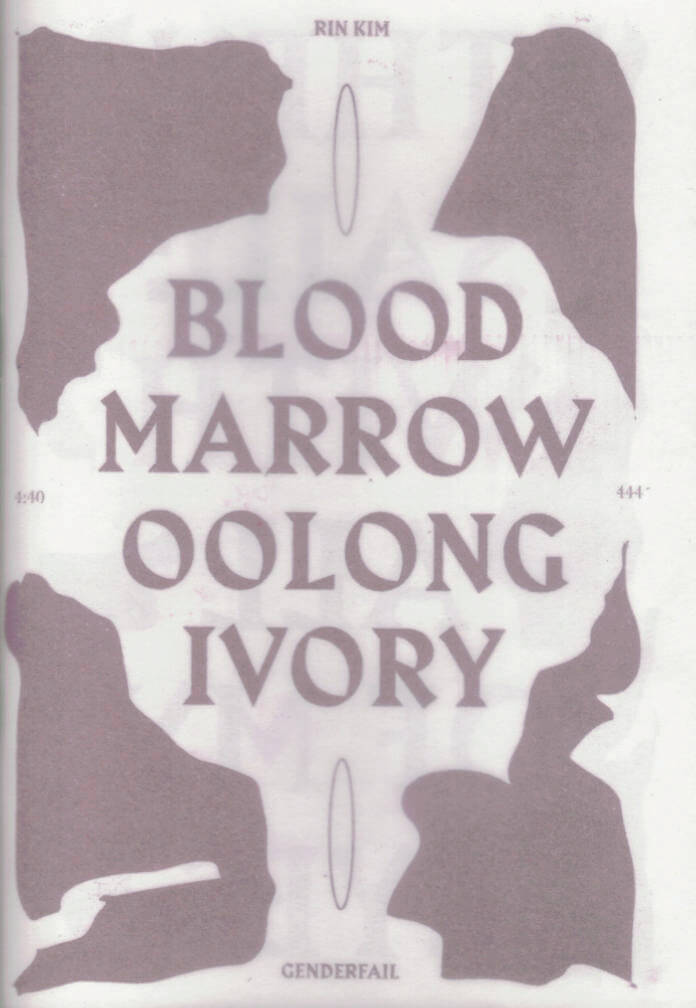
Blood Marrow Oolong Ivory
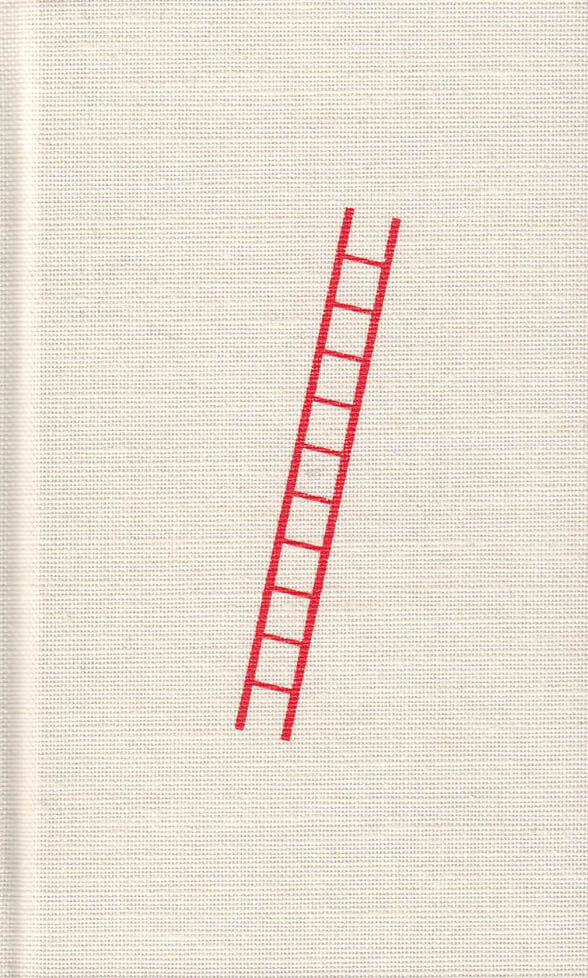
Traversals
TRAVERSALS is based on a series of conceptual interviews with Dora Garcia, Chris Kraus, Mark von Schlegell, Charles Stankievech, and Jacob Wren originally produced for an installation in an art gallery. As a re-issue of these texts, the publication continues K.'s interest in the book-as-exhibition. Each invited contributor has found a unique way to explore the hybrid spaces between genres and art forms, and the discussions focus especially on the role and relationship between visual art and writing.
While the interview process was rather formalized—with one set of five identical questions posed to each person in the first round, and then five individual questions asked in a second round in response to the first five answers—the texts themselves delight through a personal tone and a great openness for both idiosyncratic trajectories and unexpected traversals between the five different chapters.
Contributors: Dora Garcia, Chris Kraus, Charles Stankievech, Mark von Schlegell, Anna-Sophie Springer, Jacob Wren

Angoisse: Première Partie
Angoisse: Première Partie departs from the original script written for and used during its performance. The publication was then adapted listening to the sound recording and expanded with transcriptions of interactions, gestures and actions. Special edition w silk-printed handkerchiefs to weep on and wipe off those cold sweats. Graphic design, Roxanne Maillet.

On Violence
Violence is in language and violence is language. The violence of language stratifies voices into those that matter and those that do not, using ideas of appropriate form and structure as its weaponry. It claims propriety and politeness are the correct mode of address, when urgency and anger are what is needed. Where languages intersect, hierarchies of language become means for domination and colonization, for othering, suppression, negation, and obliteration. The demand for a correctness of grammar, the refusal to see what is seen as incorrect, the dismissal of vernacular in favour of the homogenised tongue: all are violent. The narrative of history is a narrative of violence. The contributions herein refuse this narrative. They explore how violence permeates and performs in language, how language may be seized, taken back to be used against the overwhelming force of structural and institutional violence that passes as acceptable or normal. Violence may be a force for rupture, for refusal, for dissent, for the herstories that refuse to cohere into a dominant narrative.
Contributors: Travis Alabanza, Katherine Angel, Skye Arundhati-Thomas, Mieke Bal, Janani Balasubramanian, Elena Bajo, Jordan Baseman, Emma Bolland, Pavel Büchler, Paul Buck,Kirsten Cooke, Jih-Fie Cheng, John Cunningham, Andy Fisher, Caspar Heinemann, Jakob Kolding, Candice Lin, Rudy Loewe, Nick Mwaluko, Vanessa Place, Katharina Poos, Tai Shani, Linda Stupart, Benjamin Swaim, Jonathan Trayner, Jala Wahid, Isobel Wohl, Sarah Wood
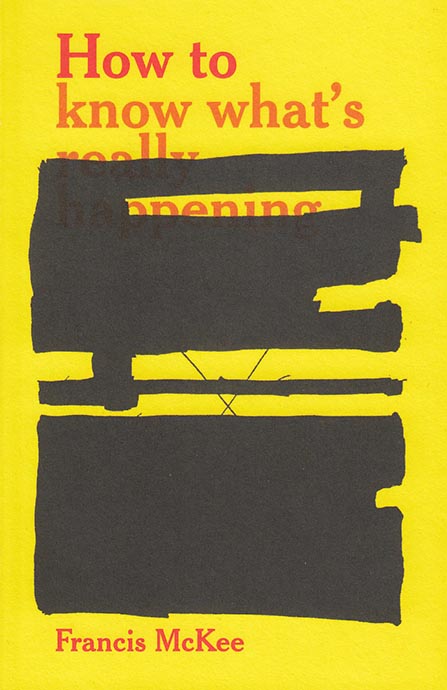
How To Know What's Really Happening
In this post-truth era, how does one navigate the endless information available and choose a viable narrative of reality? In How to Know What’s Really Happening Glasgow-based writer and curator Francis McKee looks at various techniques for determining verity, from those of spy agencies and whistle-blowers to mystics and scientists.
Francis McKee is an Irish writer, medical historian, and curator working in Glasgow where since 2006 he has been the director of the Centre for Contemporary Arts, and is a lecturer and research fellow at Glasgow School of Art. McKee has worked on the development of open-source ideologies and their practical application to art spaces.

Reseeding the library, gleaning readership
Afternoon Editions no. 1: an essay by Jeroen Peeters titled Reseeding the library, gleaning readership. In May 2017, Time has fallen asleep in the afternoon sunshine settled during three weeks in the Ravenstein Gallery in Brussels as part of the Kunstenfestivaldesarts. Invited as a writer in residence, Jeroen Peeters visited the library of living books on a daily basis and recorded his observations by hand in a notebook, which formed the basis for Afternoon Edition #1. Reseeding the library, gleaning readership is an essay on the seed library, on the dispersion of literature through wind, water and animals, on biodiversity and commoning at the heart of readership. On the cover a drawing by Wouter Krokaert of a Philodendron Xanadu. Published May 2018.
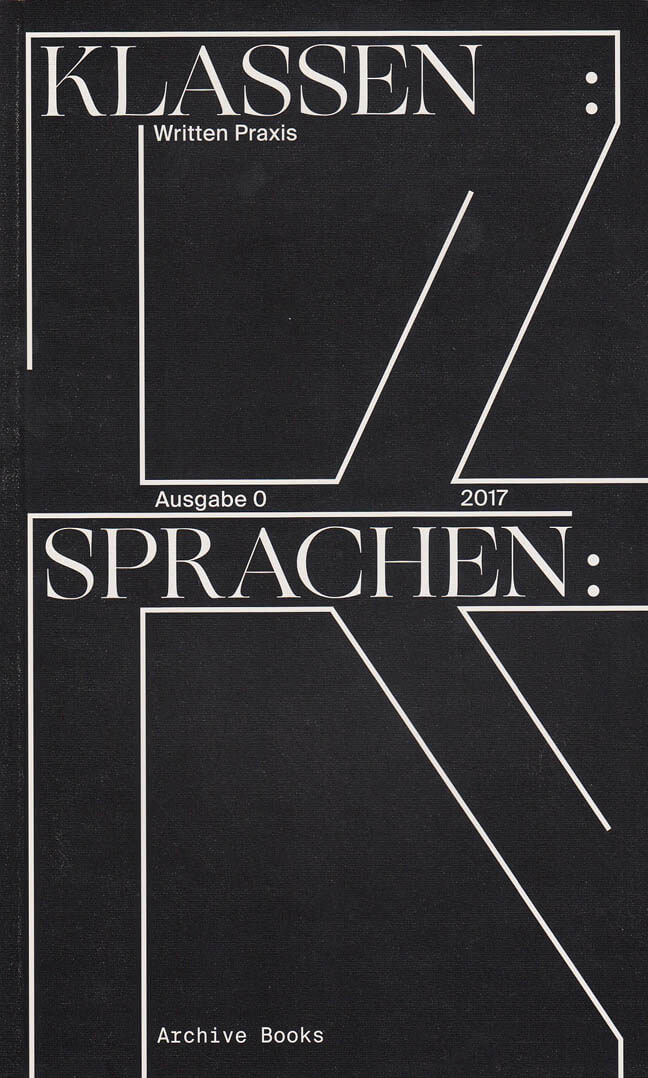
Klassen Sprachen/ Written Praxis
In dictionary entries, after its first appearance the discussed word is represented by its initial: class, class struggle, class contradiction as well as crisis, catastrophe, or colonialism become C. Our C (K in German) stands for Class Languages, and thus for the question of the verbalization, translation, and inscription of those political and social conflicts that determine our contemporary moment. Instead of passing off art as a model for a better politics, we wish to test it for the signatures, the markers and forms of these deeply antagonistic relations of which art itself is a material part: we are concerned with art as a class language, as well as with class languages in art; with art’s room for maneuver as well as with its limits and restrictions, curatorially, in writing and debate.

Civilisation & its Malcontents
Caught up in the vortex of this bellicose age, adrift on the sea of digital information and misinformation, without perspective enough to glimpse the future that is actually forming, I am finding it hard to think. Here is a book about thought right now and about how to think in a world that asks us at every level not to. Discontent? Malcontent? Sarah Wood looks at the world through Freud and fraud.

Persona
PERSONA is the second magazine in a series in response to a series of meetings of female artists entitled "A conversation to know if there is a conversation to be had" held in New York, Amsterdam, Berlin and London in 2010-11. The first journal LABOUR, addressed the question of women's work, and used the lens of the feminist critique of unpaid labour to look at the contemporary condition of the artist. PERSONA as a jumping off point looks at the condition of self-presentation for the contemporary artist, but in an expansive manner encompasses discussions on embarrassment, refusal, interiority and identification.
Contributors: Rita McBride, Celine Condorelli, Avery Gordon, Isla Leaver-Yap, Eva Kenny, Melissa Gordon, Marina Vishmidt, Josephine Pryde, Sabeth Buchmann, Chris Kraus, Audrey Reynolds, Elisabeth Subrin, Alison Carr, Karolin Meunier, Sue Tate, Nadia Hebson, Jen Liu, Da
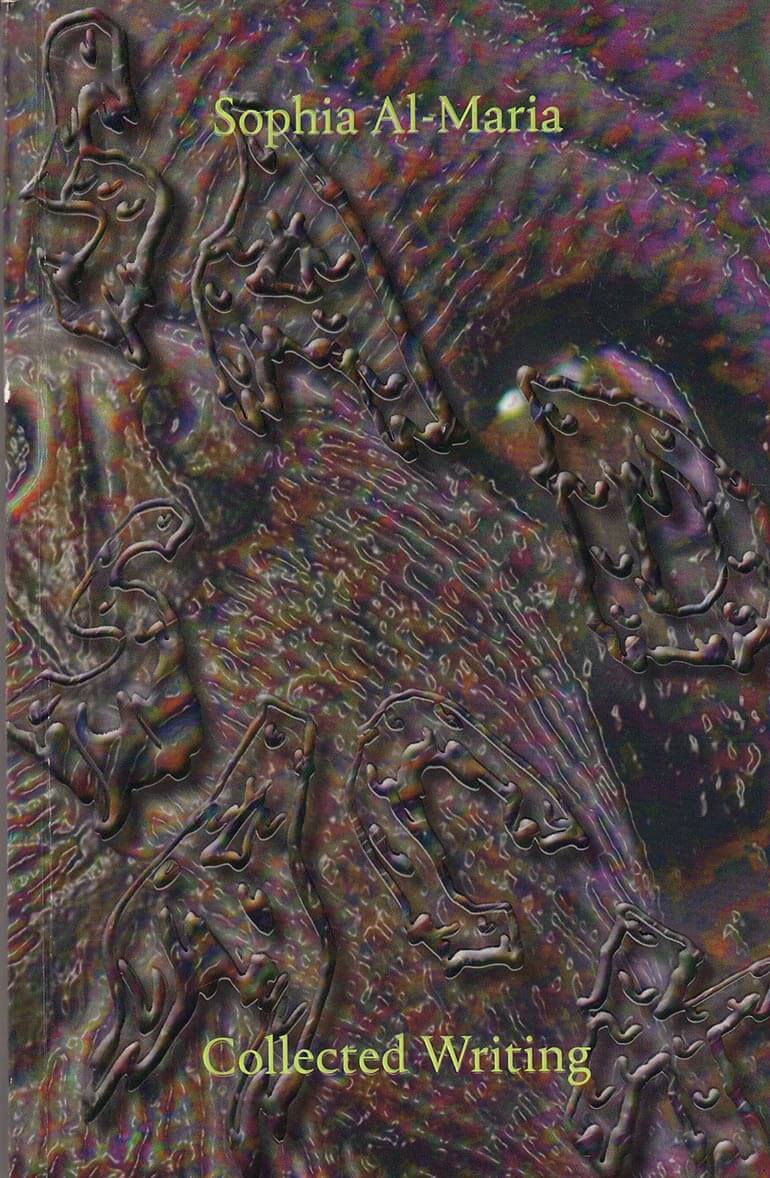
Sad Sack
Sad Sack is a book of collected writing by Sophia Al-Maria, taking feminist inspiration from Ursula K. Le Guin’s 1986 essay ‘The Carrier Bag Theory of Fiction’; opposing ‘the linear, progressive, Time’s-(killing)-arrow mode of the Techno-Heroic.’ Encompassing more than a decade of work, Sad Sack tracks Al-Maria’s speculative journey as a writer, from the first seed of her ‘premature’ memoir, through the coining and subsequent critique of ‘Gulf Futurism’, towards experiments in gathering, containing, welling up and sucking dry.
For me this book is a bag... Like any single-use carrier bag – I disapprove. It shouldn’t exist, it contributes to pollution, it should be banned... And yet, in spite of the fact I know this book may be a waste product... I’m still writing, redacting, expanding... I’m still waiting, wasting, wanting. According to Ursula, ‘It is a human thing to do to put something you want, because it’s useful, edible, or beautiful, into a bag.' – Sophia Al-Maria

A Flower is Speaking to a dog
A set of generative texts following the genetic sequencing of DNA as the underlying structure or score for its characters.
Graphic design by Gerard Herman
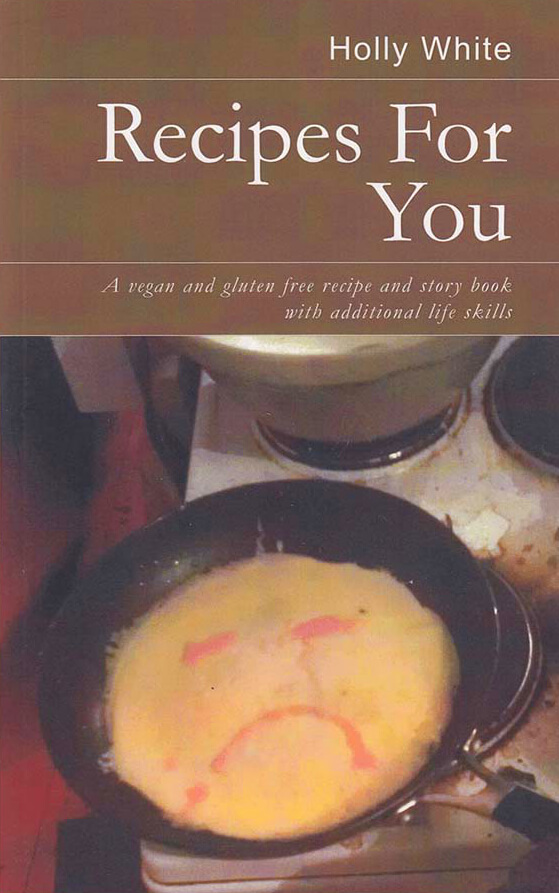
Recipes For You
Recipes for you: A vegan and gluten free recipe and story book with additional life skills is a new cookbook and survival guide by artist Holly White. Rather than selling an aspiration, the book looks honestly at our conflicted relationship with consumption. White intersperses recipes and self-sufficiency notes with prose, as the contributions collected on her food blog (http://holly-white-food.tumblr.com/) spark imagined and remembered references and memories.

Scripts
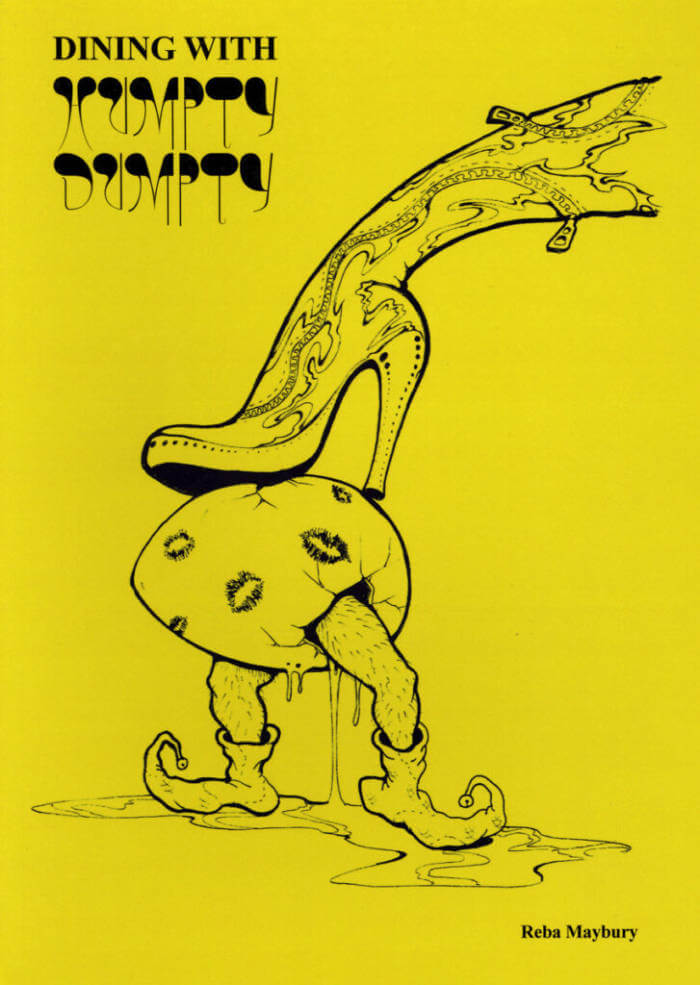
Dining with Humpty Dumpty
Mistress Rebecca is approached by a 34-year-old Tory who works in a corporate field of creativity with a feeding fetish. Such mundanity is outrageous – until he declares himself as a female supremacist. Over the period of two evenings and one afternoon in three different chain restaurants in central London, Mistress Rebecca explores Humpty Dumpty’s beliefs then pushed his adoration of humiliation and his facade of female empowerment to its limits.

Metabolize, If Able

Skinned Detouched
Skinned and Detouched, a pair of artists books, are a portal to a single performative stage in the industrial production of two large scale sculptures, one of which is on show at Large Glass. The books, including writing by Jennifer Boyd, photography by Thierry Bal and design by Europa, imaginatively document the multiple embodiments and disembodiments involved in one moment in the production of the two works.
